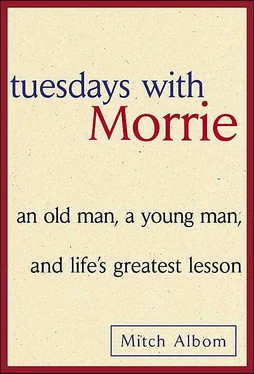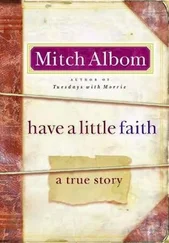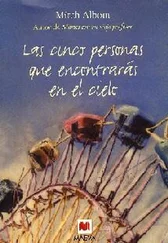“Here’s how my emotions go,” Morrie told Koppel. “When I have people and friends here, I’m very up. The loving relationships maintain me.
“But there are days when I am depressed. Let me not deceive you. I see certain things going and I feel a sense of dread. What am I going to do without my hands? What happens when I can’t speak? Swallowing, I don’t care so much about—so they feed me through a tube, so what? But my voice? My hands? They’re such an essential part of me. I talk with my voice. I gesture with my hands. This is how I give to people.”
“How will you give when you can no longer speak?” Koppel asked.
Morrie shrugged. “Maybe I’ll have everyone ask me yes or no questions.”
It was such a simple answer that Koppel had to smile. He asked Morrie about silence. He mentioned a dear friend Morrie had, Maurie Stein, who had first sent Morrie’s aphorisms to the Boston Globe. They had been together at Brandeis since the early sixties. Now Stein was going deaf. Koppel imagined the two men together one day, one unable to speak, the other unable to hear. What would that be like?
“We will hold hands,” Morrie said. “And there’ll be a lot of love passing between us. Ted, we’ve had thirty-five years of friendship. You don’t need speech or hearing to feel that.”
Before the show ended, Morrie read Koppel one of the letters he’d received. Since the first “Nightline” program, there had been a great deal of mail. One particular letter came from a schoolteacher in Pennsylvania who taught a special class of nine children; every child in the class had suffered the death of a parent.
“Here’s what I sent her back,” Morrie told Koppel, perching his glasses gingerly on his nose and ears. “‘Dear Barbara … I was very moved by your letter. I feel the work you have done with the children who have lost a parent is very important. I also lost a parent at an early age …’”
Suddenly, with the cameras still humming, Morrie adjusted the glasses. He stopped, bit his lip, and began to choke up. Tears fell down his nose. “‘I lost my mother when I was a child … and it was quite a blow to me … I wish I’d had a group like yours where I would have been able to talk about my sorrows. I would have joined your group because … “
His voice cracked.
“… because I was so lonely … “
“Morrie,” Koppel said, “that was seventy years ago your mother died. The pain still goes on?”
“You bet,” Morrie whispered.
He was eight years old. A telegram came from the hospital, and since his father, a Russian immigrant, could not read English, Morrie had to break the news, reading his mother’s death notice like a student in front of the class. “We regret to inform you …” he began.
On the morning of the funeral, Morrie’s relatives came down the steps of his tenement building on the poor Lower East Side of Manhattan. The men wore dark suits, the women wore veils. The kids in the neighborhood were going off to school, and as they passed, Morrie looked down, ashamed that his classmates would see him this way. One of his aunts, a heavyset woman, grabbed Morrie and began to wail: “What will you do without your mother? What will become of you?”
Morrie burst into tears. His classmates ran away.
At the cemetery, Morrie watched as they shoveled dirt into his mother’s grave. He tried to recall the tender moments they had shared when she was alive. She had operated a candy store until she got sick, after which she mostly slept or sat by the window, looking frail and weak. Sometimes she would yell out for her son to get her some medicine, and young Morrie, playing stickball in the street, would pretend he did not hear her. In his mind he believed he could make the illness go away by ignoring it.
How else can a child confront death?
Morrie’s father, whom everyone called Charlie, had come to America to escape the Russian Army. He worked in the fur business, but was constantly out of a job. Uneducated and barely able to speak English, he was terribly poor, and the family was on public assistance much of the time. Their apartment was a dark, cramped, depressing place behind the candy store. They had no luxuries. No car. Sometimes, to make money, Morrie and his younger brother, David, would wash porch steps together for a nickel.
After their mother’s death, the two boys were sent off to a small hotel in the Connecticut woods where several families shared a large cabin and a communal kitchen. The fresh air might be good for the children, the relatives thought. Morrie and David had never seen so much greenery, and they ran and played in the fields. One night after dinner, they went for a walk and it began to rain. Rather than come inside, they splashed around for hours.
The next morning, when they awoke, Morrie hopped out of bed.
“Come on,” he said to his brother. “Get up.” “I can’t.”
“What do you mean?”
David’s face was panicked. “I can’t … move.”
He had polio.
Of course, the rain did not cause this. But a child Morrie’s age could not understand that. For a long time—as his brother was taken back and forth to a special medical home and was forced to wear braces on his legs, which left him limping—Morrie felt responsible.
So in the mornings, he went to synagogue—by himself, because his father was not a religious man—and he stood among the swaying men in their long black coats and he asked God to take care of his dead mother and his sick brother.
And in the afternoons, he stood at the bottom of the subway steps and hawked magazines, turning whatever money he made over to his family to buy food.
In the evenings, he watched his father eat in silence, hoping for—but never getting—a show of affection, communication, warmth.
At nine years old, he felt as if the weight of a mountain were on his shoulders.
But a saving embrace came into Morrie’s life the following year: his new stepmother, Eva. She was a short Romanian immigrant with plain features, curly brown hair, and the energy of two women. She had a glow that warmed the otherwise murky atmosphere his father created. She talked when her new husband was silent, she sang songs to the children at night. Morrie took comfort in her soothing voice, her school lessons, her strong character. When his brother returned from the medical home, still wearing leg braces from the polio, the two of them shared a rollaway bed in the kitchen of their apartment, and Eva would kiss them good-night. Morrie waited on those kisses like a puppy waits on milk, and he felt, deep down, that he had a mother again.
There was no escaping their poverty, however. They lived now in the Bronx, in a one-bedroom apartment in a redbrick building on Tremont Avenue, next to an Italian beer garden where the old men played boccie on summer evenings. Because of the Depression, Morrie’s father found even less work in the fur business. Sometimes when the family sat at the dinner table, all Eva could put out was bread.
“What else is there?” David would ask.
“Nothing else,” she would answer.
When she tucked Morrie and David into bed, she would sing to them in Yiddish. Even the songs were sad and poor. There was one about a girl trying to sell her cigarettes:
Please buy my cigarettes.
They are dry, not wet by rain.
Take pity on me, take pity on me.
Still, despite their circumstances, Morrie was taught to love and to care. And to learn. Eva would accept nothing less than excellence in school, because she saw education as the only antidote to their poverty. She herself went to night school to improve her English. Morrie’s love for education was hatched in her arms.
Читать дальше












